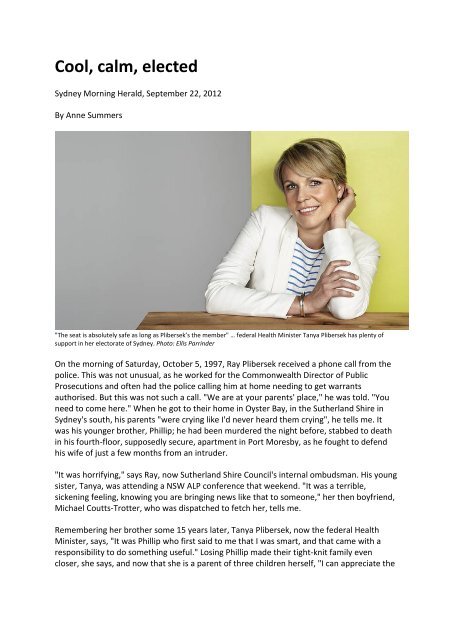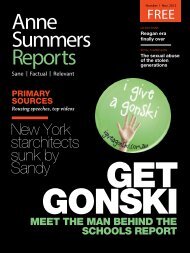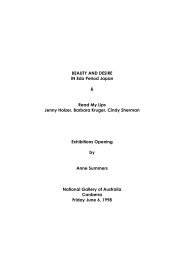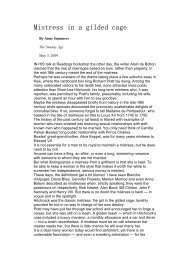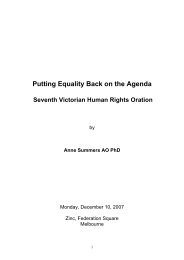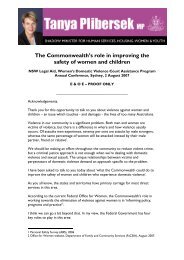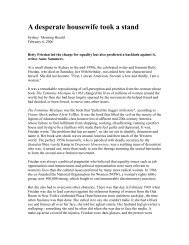Read article.
Read article.
Read article.
You also want an ePaper? Increase the reach of your titles
YUMPU automatically turns print PDFs into web optimized ePapers that Google loves.
Cool, calm, elected<br />
Sydney Morning Herald, September 22, 2012<br />
By Anne Summers<br />
"The seat is absolutely safe as long as Plibersek’s the member" … federal Health Minister Tanya Plibersek has plenty of<br />
support in her electorate of Sydney. Photo: Ellis Parrinder<br />
On the morning of Saturday, October 5, 1997, Ray Plibersek received a phone call from the<br />
police. This was not unusual, as he worked for the Commonwealth Director of Public<br />
Prosecutions and often had the police calling him at home needing to get warrants<br />
authorised. But this was not such a call. "We are at your parents' place," he was told. "You<br />
need to come here." When he got to their home in Oyster Bay, in the Sutherland Shire in<br />
Sydney's south, his parents "were crying like I'd never heard them crying", he tells me. It<br />
was his younger brother, Phillip; he had been murdered the night before, stabbed to death<br />
in his fourth-floor, supposedly secure, apartment in Port Moresby, as he fought to defend<br />
his wife of just a few months from an intruder.<br />
"It was horrifying," says Ray, now Sutherland Shire Council's internal ombudsman. His young<br />
sister, Tanya, was attending a NSW ALP conference that weekend. "It was a terrible,<br />
sickening feeling, knowing you are bringing news like that to someone," her then boyfriend,<br />
Michael Coutts-Trotter, who was dispatched to fetch her, tells me.<br />
Remembering her brother some 15 years later, Tanya Plibersek, now the federal Health<br />
Minister, says, "It was Phillip who first said to me that I was smart, and that came with a<br />
responsibility to do something useful." Losing Phillip made their tight-knit family even<br />
closer, she says, and now that she is a parent of three children herself, "I can appreciate the
depth of my parents' sorrow better. It's made me more tender and gentle with them, even<br />
when they drive me crazy."<br />
Seat of power … Tanya Plibersek during Question Time at Parliament House in February. Photo: Fairfaxsyndication.com<br />
Her brother's murder occurred just a few weeks before the ALP preselectors in the safe<br />
federal electorate of Sydney were due to choose their candidate to replace sitting member<br />
Peter Baldwin. Baldwin, who'd been a minister in the Keating government, had thrown NSW<br />
Labor into a tailspin a few months earlier by announcing he would not re-contest the seat.<br />
Tanya Plibersek had been a front-runner to replace him but now she was immobilised with<br />
grief. "I didn't think about anything," she tells me. "I didn't think about dropping out, I didn't<br />
think about continuing, I didn't think about anything."<br />
Advertisement<br />
She lost "stacks of weight", says a friend. But there was a deadline: a candidates' forum just<br />
three weeks after Phillip's death. She went. "People were very kind to me and I didn't see a<br />
point in not doing it," Plibersek tells me with tears in her eyes. "It was just a matter of<br />
whether I could, and I found that I could - so I did." People at that meeting remember her<br />
saying that her brother would have wanted her to continue.<br />
"Had it all, Sydney did," recalls a Labor Party official who was in the thick of it. The lack of<br />
notice, the absence of a succession plan, the strict continuity rules of party membership<br />
governing eligibility to vote all combined to ensure this rare rank-and-file preselection<br />
contest was wide open. "There was no time to branch stack," says one of the numbers men.<br />
In the end there were nine candidates, eight women and a man in a wheelchair who, in the<br />
words of one of the operatives, "made merry of the fact that the ALP had affirmative action<br />
for women but not for disabled people".
The Plibersek family in Parramatta in 1982 – (from left) Rose, Ray, Joseph, Phillip and Tanya. Photo: courtesy of Tanya<br />
Plibersek<br />
A safe federal seat like Sydney is a valuable political prize, well worth fighting for. It finally<br />
came down to a contest between two young women, both from migrant backgrounds and<br />
both from the left: the then 36-year-old Chrissa Loukas, a criminal law barrister, versus the<br />
28-year-old Tanya Plibersek. Each had heavy guns in respective corners. Plibersek was<br />
supported by past and present parliamentarians of the left: Anthony Albanese, Robert<br />
Tickner, Tom Uren, Jeanette McHugh and Bruce Childs. Uren, the Labor warhorse who, as<br />
Gough Whitlam's minister for urban and regional development, had returned huge tracts of<br />
Sydney's Glebe and Woolloomooloo to high-quality public housing, went door-to-door for<br />
Plibersek to people who literally owed him their houses.<br />
Loukas went one better: she had a letter signed by Whitlam, former NSW premier Neville<br />
Wran and Jennie George - ACTU president at the time. "We believe she is the outstanding<br />
candidate in the Sydney preselection," the letter stated.<br />
On December 13, Plibersek won the ballot decisively, getting 128 primary votes to Loukas's<br />
65 and, after the distribution of preferences, winning 57.9 per cent of the final vote. Today,<br />
Loukas, who is with the NSW Public Defenders' Office, is philosophical about her defeat and<br />
says Plibersek "appears to be a very effective politician, both as a local member and a<br />
minister". Others I spoke to who voted for Loukas because she was older and more<br />
experienced today concede that Plibersek has exceeded all their expectations.
Family first … (from left) Tanya Plibersek, daughter Anna, husband Michael Coutts-Trotter and sons Louis and Joseph.<br />
Photo: Courtesy of Tanya Plibersek<br />
The night before the ballot, Whitlam telephoned some voters in a last-ditch effort to help<br />
Loukas. "Most of the people he rang did not believe it was him," Plibersek tells me. She is<br />
proud of the fact that Margaret Whitlam voted for her. "I split the Whitlam household," she<br />
says with evident enjoyment.<br />
Plibersek was born in 1969 and grew up in Oyster Bay, which was then a bush suburb filled<br />
with fibro cottages and returned-soldier housing. "The roads were unpaved. Kids played in<br />
creeks, catching tadpoles and riding their bikes," Plibersek recalls. "Few families had TV sets<br />
or cars until much later. Mum washed by hand, with a scrubbing board. The baker and<br />
milkman called daily."<br />
Her father, Joseph, had built the family's first house himself, returning at weekends from<br />
the Snowy Mountains where he, like thousands of other migrant men, was employed on the<br />
nation-building hydro-electric scheme. But when Tanya was born, the adored little sister to<br />
her older brothers Ray, 12, and Phillip, 10, the family moved to a larger place in the same<br />
suburb. Joseph Plibersek spent the rest of his working life as a plumber at Qantas, while his<br />
wife, Rose, maintained their home. The family was incredibly close; they spoke Slovenian at<br />
home, and the parents could scarcely contain their pride in their clever children.<br />
Both of Tanya's parents had been peasant farmers in Slovenia. Her mother, Rosalija Repic,<br />
worked as a farm labourer from the age of 13 after being kicked out of home by an abusive<br />
stepmother. Tanya is still overwhelmed by her mother's bravery: she escaped to Italy,<br />
applied to emigrate and, in her early 20s, with no English, travelled alone to Australia and<br />
worked as a domestic and in factories until, one night at a Slovenian dance at Paddington<br />
Town Hall in December 1956, she met Joze Plibersek.<br />
There is a family photo that shows Joze, aged about 10, barefoot, standing beside a bullock<br />
hauling a wooden plough steered by his father. The boy's job was to feed and take the farm<br />
animals out into the fields before trudging seven kilometres down the mountain to school.
Like his future wife, he also escaped - to Austria - and after being detained for some months<br />
was accepted as an immigrant to distant Australia. On May 9, 1953, along with other<br />
displaced persons, he sailed from Bremerhaven in Germany. On arrival he was sent to work<br />
as an indentured labourer on the Broken Hill railway.<br />
Joze and Rosalija became Joseph and Rose; they married in May 1957 and over the next 12<br />
years had three children; when Joseph died, aged 80, in April, he had lived long enough to<br />
see his youngest child sworn in as a cabinet minister.<br />
Tanya Plibersek's involvement in politics began when she was 14. Genevieve Kelly, formerly<br />
Rankin, a campaigner against the Lucas Heights nuclear plant and a former mayor of<br />
Sutherland Shire, remembers Plibersek from when she was still at Jannali Girls High in the<br />
mid-1980s, organising her friends to go to the massive Palm Sunday peace rallies.<br />
She joined the Labor Party when she was 15, encouraged by Hazel Wilson, a Sutherland<br />
Shire councillor and Labor Party stalwart who lived near the Pliberseks and who heard a<br />
young Tanya present at an International Youth Year event. "We need you," Wilson told the<br />
schoolgirl.<br />
Ray Plibersek says no one else in the family joined the party but he remembers his parents<br />
voting for Gough Whitlam, and Tanya has memories of them "loving" Whitlam, Al Grassby<br />
and Bob Hawke. Tanya remembers sitting on her father's lap watching TV when she was<br />
three or four and recognising Gough and Margaret Whitlam stepping off a plane. "Dad, he's<br />
a good man, isn't he?" she somewhat precociously said. And the kids talked politics with<br />
each other.<br />
"Phillip, the scientist, was very pragmatic," says Tanya. "He was in favour of uranium mining<br />
and Ray was against. Phillip favoured the third runway and wanted a T-shirt that said, 'I ❤<br />
airport noise.' " Ray discouraged Tanya from her youthful infatuation with Margaret<br />
Thatcher. While Tanya thought it was great that a woman was prime minister of Britain, Ray<br />
said to her, "Let's look at some of her policies and see what we think of them."<br />
Plibersek studied communications at Sydney's University of Technology (UTS), intending to<br />
become a journalist, but the ABC knocked her back for a cadetship. She was then elected<br />
women's officer at UTS and ran a campaign on women's safety, and when she graduated in<br />
1993, she took a research job in the domestic violence unit of the NSW Ministry for the<br />
Status and Advancement of Women. She stayed less than a year, frustrated with the<br />
seeming lack of commitment to the issue by John Fahey's NSW Liberal government. She got<br />
a job researching and writing speeches with Senator Bruce Childs, convenor of the ALP's Left<br />
faction, during the Keating government's second term.<br />
Plibersek says she did not see the job "as a stepping stone for myself" into politics, but she<br />
did rejoin the party that she'd left in 1986, disgusted by ALP policies on uranium and land<br />
rights, signing up at the Kings Cross branch, which was then in the heart of the electorate of<br />
Sydney. And so, as the result of "a list of coincidences", as she puts it, Tanya Plibersek was<br />
sitting pretty when Peter Baldwin announced his retirement.
Plibersek was elected to Federal Parliament on October 3, 1998, along with 15 other women<br />
including Julia Gillard, Nicola Roxon, Anna Burke, Cheryl Kernot (as a Labor MP) and, on the<br />
Liberal side, Julie Bishop. Fourteen years later, despite the encroachment of the Greens into<br />
inner-city politics and a rising Liberal vote due to wealthy people settling in places like<br />
Balmain, Sydney is still safe for Plibersek. In the 2010 federal election, she won 67.07 per<br />
cent of the vote after preferences were distributed. She is so popular in Sydney that,<br />
according to a colleague, people who are not party members work for her on election day.<br />
"The seat is absolutely safe as long as she's the member," says a federal colleague.<br />
Since 2007, Plibersek has held the non-cabinet portfolios of Housing, Status of Women,<br />
Social Inclusion and Human Services. In December last year, she was elevated to cabinet.<br />
She asked for the $51.1 billion Health portfolio, she says, because "if we get it right we can<br />
literally improve the lives of millions of people".<br />
As a junior minister, she pulled off two impressive feats - the $1.1-billion National<br />
Partnership Agreement on Homelessness, and the $44.5- million National Plan to Reduce<br />
Violence Against Women and Their Children. The homelessness approach is "more<br />
sophisticated and more ambitious than you would see around the world", says Tony<br />
Nicholson, executive director of the not-for-profit organisation Brotherhood of St Laurence,<br />
which works with disadvantaged people.<br />
"There was a lot of emphasis on housing people permanently, not just transitioning them<br />
through temporary housing," Plibersek explains. "It went hand in hand with investment we<br />
did in 21,000 affordable housing units, because you can't fix homelessness if you don't fix<br />
affordable housing."<br />
Karen Willis, director of the NSW Rape Crisis Centre, which under the National Plan to<br />
Reduce Violence received funding of $12.4 million to take over the national crisis telephone<br />
counselling line previously managed by Lifeline, says they were "devastated" when Plibersek<br />
left the portfolio. "Tanya was marvellous," says Willis. "She had a good understanding not<br />
just of the horrors of violence, but of the causes and the impacts; she understands trauma<br />
and the need to have highly qualified counsellors."<br />
In her first few months in health, Plibersek presided over an expansion of the National<br />
Bowel Cancer Screening Program and included boys in the Gardasil immunisation program,<br />
and it was she who got Labor's long-standing policy of means-testing the private health fund<br />
rebate through Parliament. The problem with the immense, complicated and fast-growing<br />
health system is that its structural components tend to reduce the capacity for creative<br />
change. And the rapidly approaching tsunami of ageing baby boomers will put pressure on<br />
the universal health system. "Tanya knows this," says a colleague, who says she is totally<br />
committed to maintaining universality.<br />
Will Plibersek have scope in Health for really big reform? The consensus among bureaucrats<br />
I spoke to was: no. "There's no money and no time," says one. So it was quite stunning<br />
when, at a hurriedly convened press conference at the Sydney Dental Hospital on August 29,<br />
Plibersek announced that two days earlier, cabinet had approved a $4.1-billion meanstested<br />
dental care program for children and low-income adults. "We'll have a generation of
kids for whom going to the dentist will be as easy as going to the doctor," Plibersek<br />
announced. The scheme won't start until 2014, its funds have yet to be found and it was<br />
odd that the Prime Minister was not there for a social-reform announcement of this<br />
magnitude (Gillard was in the Cook Islands for the Pacific Islands Forum), yet it was<br />
undoubtedly a major coup for the Health Minister.<br />
To understand Tanya Plibersek, says her husband, you have to understand her relationship<br />
to Jane Austen. To say she is a fan is like saying the sky is blue. Elinor Dashwood, the heroine<br />
of Sense and Sensibility, is Plibersek's favourite character: "I admire her ability to carry on<br />
despite her sadness and loss," she says. Austen provides "insights, advice and cautions for a<br />
young lady legislator", she told the Jane Austen Society of Australia in Sydney in 2007. "I<br />
thank Jane Austen for the merciful release from melodrama she has provided in Elinor: for<br />
demonstrating that strong feelings need not be on constant display."<br />
It seems strange, this attachment by this left-wing daughter of Slovenian peasants to the<br />
genteel worlds depicted by Austen. But Plibersek is drawn to old-fashioned notions of<br />
kindness and gratitude and, she tells me, "a strong sense of responsibility"; the idea of<br />
"service" is what drives her. This is the person who left a welcome note on the desk of<br />
Queensland Labor Senator Claire Moore on her first day in Canberra in 2002, the person<br />
who visits a homeless man who now has a place to live thanks to her reforms. Austen would<br />
recognise this person, for whom feelings of sadness and loss are never far away.<br />
The quality people most talk about when describing Plibersek is her calmness. "She doesn't<br />
panic when things go wrong," says Lynelle Briggs, the former CEO of Medicare. Plibersek's<br />
composure is one reason for her huge popularity on the ABC's Q&A program. She, along<br />
with Malcolm Turnbull and Christopher Pyne, is the show's most invited guest. "People<br />
appreciate that she keeps her cool even when the debate gets heated," says Peter McEvoy,<br />
the program's executive producer. "Her responses aren't glib or pre-packaged - when she<br />
answers a difficult question you can see she's wrestling with the difficulties." On a Q&A<br />
program in October last year, she told fellow panellist and former ALP heavyweight Graham<br />
Richardson, with characteristic calmness, "I hope when I retire I never make a buck trashing<br />
the Labor Party."<br />
Yet her serenity on camera belies what she describes as an utterly "nerve-racking"<br />
experience. On Monday nights, "I hear the music and I feel sick and nervous in the same<br />
way as when I am on," she tells me. She continues to do it, not because it's enjoyable - it<br />
isn't - but "it is a great opportunity to talk about what we are doing".<br />
Plibersek is regarded as one of the government's best communicators, able to convey<br />
complex issues in easily understood language. "She has great presentational skills," says<br />
Deputy Prime Minister and Federal Treasurer Wayne Swan. He also praises her "great grace<br />
and temperament". There is never a raised voice or even a frown. Rather, says fellow<br />
minister Kate Ellis, Plibersek is the one to lighten the mood with a joke if a colleague is<br />
downcast, perhaps because of a bad poll or other political setback.<br />
But Plibersek also provokes extreme reactions in people. Some use words like "adore" and<br />
"love" to describe their feelings for her. Her childhood mentor Hazel Wilson, now 85, says,
"Tanya is loved by all women. Old women look on her as a daughter and younger women<br />
want her as a mentor." Yet I have also heard her described as "a complete fake", "a show<br />
pony", "completely lazy", as having "no personal loyalty" and as "totally nutty - there's<br />
nothing she wouldn't do".<br />
"It's like there's two Tanyas," says someone who has watched her closely over the years. A<br />
more dispassionate observer tells me it is "dangerous to underrate her because she's such a<br />
nice person [and think] that she's not sharp as a razor". And behind the pleasant demeanour<br />
there is a steeliness, as a statutory agency head discovered when Plibersek told her to "just<br />
suck it up" when she complained about changes to her area.<br />
On their very first date, in 1991, Michael Coutts-Trotter told Plibersek that he had served<br />
almost three years of a nine-year prison sentence on a drugs charge. He'd done time in<br />
maximum-security jails like Long Bay, Bathurst and Parramatta ("A genuinely bleak place,"<br />
he calls it) before ending up in Silverwater and work release. After being paroled in 1988, he<br />
spent a year at a Salvation Army rehab facility. Three years after this, still on parole,<br />
attending Narcotics Anonymous and not drinking alcohol, he was opening his soul to the<br />
woman who would become his wife nine years later.<br />
Plibersek says she never feared that he might revert to his old ways "because he was so<br />
honest about it and so disappointed in his life". It was not one he wanted to go back to, he<br />
told the boys at his old school, Sydney's Saint Ignatius' College, in 2009: "I was in jail, 6 1/2<br />
stone [41.2 kilograms], psychotic from lack of drugs and lack of sleep, charged with<br />
conspiracy to import half a kilo of heroin, and humiliated by the things I'd done, and the<br />
things I'd failed to do, in using and selling drugs." And very lucky to be alive: "I hadn't<br />
overdosed or been shot either of the times I'd been robbed at gunpoint," he told the rapt<br />
school audience. "I didn't have the AIDS virus, despite sharing syringes with a lot of gay men<br />
in Darlinghurst in the early 1980s."<br />
But for all his determination to remake his life, Coutts-Trotter would forever have a criminal<br />
record. When he graduated with a degree in communications from UTS in 1995, he landed a<br />
job in the office of Brian Howe, then Labor deputy PM, but his new career in Canberra was<br />
quickly derailed when ASIO denied him a security clearance. A few months later, his record<br />
initially meant he was passed over when he applied to be press secretary to Michael Egan,<br />
treasurer in the newly elected Carr Labor government in NSW, but someone put in a good<br />
word and Egan directed that he at least be given an interview.<br />
Egan tells me that the selection committee thought he was the standout candidate but that<br />
there was this problem. Egan had other objections. "I don't like the fact you have a<br />
hyphenated name or been educated by the Jesuits," he tells me he said to Coutts-Trotter.<br />
"And if I give you the job, your background will come out."<br />
It took about six months. The Sunday papers ran with the story that the treasurer's press<br />
secretary had been in prison for heroin, but by then Coutts-Trotter had made himself<br />
indispensable - and not just to Egan. "Treasury just fell in love with him," Egan recalls. The<br />
treasurer mounted a strong defence of his staffer and the media went quiet. Coutts-Trotter<br />
stayed almost seven years, becoming Egan's chief of staff and a confidant of the state's
leading bureaucrats before being headhunted for the position of director-general of the<br />
NSW Department of Commerce. Then, in April 2007, then NSW education minister John<br />
Della Bosca appointed Coutts-Trotter director-general of the NSW Department of Education<br />
and Training and the whole question of his criminal past blew up again.<br />
It was pointed out that someone with his record could not be employed as a teacher.<br />
Coutts-Trotter fronted the media: "Twenty-three years ago I was convicted of a very serious<br />
drug offence," he told them. "Luckily and remarkably in life I've been given a second<br />
chance." He asked to be able to prove himself. This time, Plibersek tells me, the newspaper<br />
stories were "pretty traumatic" as the children were old enough to understand. They had to<br />
be told that Daddy had been in prison.<br />
Plibersek says she chose to do it while they were in the car ("It's a good place to have these<br />
conversations, less formal than sitting them down ..."). "There's something in the papers,"<br />
she tells me she said to them. "When he was young, your father did the wrong thing and he<br />
was punished."<br />
"I know," said six-year-old Anna.<br />
"The kids at school might talk about it," she told them. "Do you have any questions about<br />
it?"<br />
"No."<br />
"They were completely uninterested," Plibersek tells me now. Plibersek was nevertheless<br />
worried and over the intervening years has raised it with them, just to check if there is a<br />
problem, but "their lived experience of Michael is of a loving, kind father and husband, and<br />
his past is just irrelevant to them. They don't imagine my life before children, either."<br />
Coutts-Trotter "has become a role model to those still behind the walls and razor wire of<br />
state prisons", wrote author Bernie Matthews, himself a former prisoner, in an online<br />
opinion site in 2007. Not only had Coutts-Trotter been able to resist the drug culture of<br />
prison, and to go cold turkey, Matthews wrote, but he is "one of the very few whose sheer<br />
guts and determination successfully defeated the vicious cycle of prison-parole-and-moreprison".<br />
Another validation of sorts came in April 2011 when the newly elected NSW Liberal<br />
government of Barry O'Farrell kept Coutts-Trotter on. He has attracted plenty of flak from<br />
his Labor mates, though, because in his new position as Director-General of the NSW<br />
Department of Finance and Services he was involved in implementing industrial relations<br />
legislation that NSW Opposition Leader John Robertson has described as "worse than Work<br />
Choices".<br />
The cabinet minister and her director-general husband have three children: Anna, 11,<br />
Joseph, 7, and Louis, nearly two. Each of the children was born since Plibersek was elected<br />
to Parliament and each of them was breastfed for the first year. "I don't know how she does<br />
it," was probably the most frequent comment people made to me about her. "His<br />
[Michael's] diary person and my diary person talk a lot," says Plibersek.
"You'd see Tanya in the [Qantas] Chairman's Lounge, breastfeeding the baby, on the phone,<br />
going down to Canberra," says Elizabeth Broderick, the Sex Discrimination Commissioner.<br />
"She makes it look easy when I so know that it's not." Says Lynelle Briggs: "When she first<br />
became our minister [for Human Services in September 2010], she gave birth within a<br />
month but she was back within a few months. She did not miss a beat."<br />
Plibersek is a model employer, say colleagues and staff. People set their own hours, getting<br />
the job done but feeding babies at work or picking up from childcare as well. "You'd walk<br />
into Tanya's office [in Parliament House] and there'd be a cradle or a playpen. She made no<br />
apology or no attempt to hide them away from lobbyists or other visitors," says Senator<br />
Claire Moore. "She shows it can be done." As does her husband. "Michael schedules most of<br />
his meetings in standard work hours - not 7am starts - because we have childcare<br />
responsibilities," Plibersek tells me. "That doesn't just benefit him, it makes it easier for his<br />
colleagues."<br />
Phillip Plibersek's murderer was never convicted. He escaped from custody, so there was no<br />
trial, which meant, says Coutts-Trotter, "there was no possibility of either vengeance or<br />
forgiveness" for the Plibersek family. There is "acceptance" of what happened, but no<br />
peace. "There would not be a day and there would seldom be an hour when I didn't think of<br />
him," says Tanya Plibersek. "Not in a maudlin way but just, 'Oh, Phillip liked that song, or<br />
that motorbike' or something like that."<br />
In 2002 the family was contacted by Dr Ray Binns, an internationally recognised geologist<br />
from the CSIRO who ran a research team that looked at mineral deposits on the deep ocean<br />
floor near Papua New Guinea. Phillip Plibersek, who was a geologist with Placer Pacific, a<br />
mining company, had regularly attended the group's meetings. Shortly after the death,<br />
Binns and his team discovered an unnamed 1000-metre-high seamount in the Woodlark<br />
Basin in the Solomon Sea. It was nearly two years later, in April 2001, that the GEBCO Subcommittee<br />
on Undersea Feature Names agreed that a seamount located at 10° 35.01' S and<br />
153° 43.14' E be known as the Plibersek Seamount. "We named it for him because we were<br />
sorry to lose him," Binns tells me. He and several colleagues from the CSIRO framed a map<br />
of the seamount's location and, together with a sample of its basalt, they presented it to the<br />
family at an afternoon tea at a restaurant in Sydney's Chowder Bay.<br />
There they sat, the Pliberseks, remembering their lost son and brother: Joseph and his wife<br />
Rose, once peasants and refugees from Slovenia, now Australian, with their lawyer son Ray<br />
and their daughter Tanya, the politician whose electorate encompasses the great calming<br />
expanse of water we call Sydney Harbour.<br />
<strong>Read</strong> this <strong>article</strong> online at: http://www.smh.com.au/lifestyle/cool-calm-elected-20120917-<br />
2612j.html


